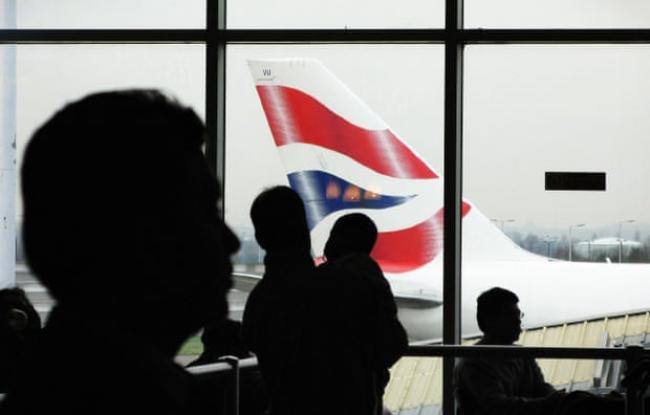Articles Menu

4 Sep 2019
Activists plan to release drones near the airport. Their possible arrest is a small price to pay for fighting the climate crisis
Obedience is dangerous. It has facilitated every form of institutional oppression and violence. Every advance in justice, peace and democracy has been made possible by disobedience. Ethical progress is unlikely when we do only what we are told.
We owe our right to vote, our freedom from servitude and subjection, our prosperity and security to people reviled in their time as lawbreakers and reprobates. Breaking the law on behalf of others is a long and honourable tradition.
Next week, a few dozen unaffiliated activists intend to start something they call Heathrow Pause. They will each fly a toy drone within the restricted zone (a circle 5 nautical miles (9km) wide) around Heathrow airport. The drones will fly nowhere near the flight paths, and never above head height, ensuring they present no risk. But any drone activity forces the airport to suspend all flights. The activists know they face arrest and, possibly, long prison sentences.
Their aim is to launch their drones consecutively, stopping flights for as long as possible: perhaps for several days. In doing so they seek to denormalise one of the most destructive activities on earth. Once unthinkable, then a bizarre novelty, then an extraordinary luxury, then a hope, then an expectation, flying – and flying frequently – is now treated as a right. Worldwide, the number of flights is expected to double in 20 years. In the UK, if aviation growth is unchecked, it will soon account for most of carbon we can afford to burn, if the government is to meet its obligations under the Paris Agreement. Even current levels of flying make a nonsense of international commitments. Yet everywhere, governments are seeking to expand airport capacity.
Those who defend the sector point out that it currently produces “only” 2.4% of the world’s emissions. But this is because just 20% of the world’s people have ever flown. In terms of individual impact, taking a flight, because of the quantify of fuel it uses, inflicts more harm on the living planet and its people than anything else you are likely to do.
Even in rich nations, flying is overwhelmingly concentrated among the wealthiest citizens. In the UK, 15% of the population accounts for 70% of flights. Those most likely to fly frequently, according to House of Commons research, have a second home abroad and a household income of over £115,000. We are told that flying is about freedom. It is: the freedom of the rich to destroy the lives of the poor.
As flying expands, it will become one of the principal causes of global heating. The impact is already greater than the 2.4% of emissions suggests, as planes create cirrus clouds that roughly double the overall heating effect. There are technological alternatives for most of our damaging activities. But not flying. Biofuels will cause more problems than they solve. Large electric planes, for all the hype surrounding them, are many years away, and may never materialise.
Carbon offsets are now redundant: the only way of preventing more than 1.5°C of heating is drastically to reduce emissions, while simultaneously using the protection and restoration of nature to draw down carbon from the atmosphere. One is not a substitute for the other: we need to maximise both. The only realistic option is to travel less.
Yet flying on a whim is being normalised, even hypernormalised. According to Tatler magazine, whose target readers are extremely wealthy, “The Long-Haul Long Weekend is now a thing.” It gushes about escaping from “grey England” to the Seychelles for four days, or to Kenya, Antigua or Cape Town, a mere 11 hours away. “Slip off to one of these destinations on a Thursday night and you can be back by Tuesday with an adventure worth shouting about.”
The travel editor of the Independent seeks to justify the 67 flights she took last year, on the grounds that her job demands it: “I don’t feel guilty about it yet.” Perhaps she should question the value of her job. The most depressing thing I have seen in the past year is Jane Goodall’s appearance in an advertisement for British Airways. When a prominent environmentalist endorses an airline company, you know we are in deep moral trouble.
The socially just solution is the frequent flyer levy proposed by the Free Ride coalition. There would be no aviation tax for the first flight in any year that a person takes, but escalating taxes on subsequent flights. Set at the right level, the levy would avert the need for airport expansion, and steadily scale down the industry. But don’t expect the government to listen. The new transport secretary, Grant Shapps, was previously chair of the British Infrastructure Group, which lobbied “to ensure that every opportunity for growth is seized”.
Nothing will change until the impacts of flying become salient. One of the Heathrow Pause campaigners, Valerie Brown, told me “I’m petrified of course … It’s not easy to face the idea of prison, but it’s even more frightening to me to think about what my grandchildren and all the children of the world will face in 20 or 30 years’ time.” Another, James Brown (no relation), explained that he decided to act when he found his adult daughter was incapacitated with grief about ecological destruction. “I’m prepared to face the consequences. I don’t know what prison will be like for me. But against the alternatives it’s a small price to pay.”
They risk their liberty in the hope of freeing us from the momentous consequences of climate breakdown. History will judge them kindly.
[Top photo: ‘Once unthinkable, then a bizarre novelty, then an extraordinary luxury, then a hope, then an expectation, flying – and flying frequently – is now treated as a right.’ Photograph: Adrian Dennis/AFP/Getty Images]